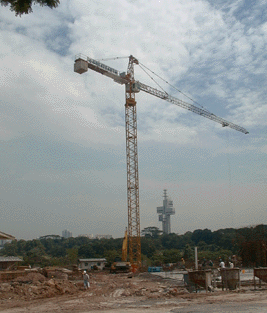 Near the end of Rice Bowl, the novelist juxtaposes Paul Tan's experience of two things characteristcally Singaporean, the humid tropical heat and the apparently ever-present scaffolding, construction sites, and bright yellow cranes -- this last, the physical signs of a nation always under construction, always choosing to make itself anew:
Near the end of Rice Bowl, the novelist juxtaposes Paul Tan's experience of two things characteristcally Singaporean, the humid tropical heat and the apparently ever-present scaffolding, construction sites, and bright yellow cranes -- this last, the physical signs of a nation always under construction, always choosing to make itself anew:
"He was hot and tired, enmeshed in the sticky lethargy of the mid-morning heat caused by the recent dry spell whose crushing pressure had squeezed the few remaining drops of moisture in his already arid soul. The struggle to remain cool and alert this morning was proving to be too much of a strain. With a sense of defeat he put down his pen and swivelled his chair to look out of the window. No tree cheered his spirit. There were the usual scaffolding and machinery at work banging out a dull thud, thud matching the throbbing of the vein in his left temple. He watched the slow circular motion of the yellow crane's gigantic arm swinging a huge cement block into place in the midst of piling machines hammering steel rods into the foundation of yet another multi-storey office block. Such activity had always bolstered his confidence in an affluent Singapore. But today these signs were dreary reminders of Marie, vehemently critical of this frantic tearing down ofthe old to build the new. This thoughtless erasing of the past, she had argued, would only leave us with economic gods to revere." [264-65]
Why does Lim include this characteristically Singaporean situation or image at this particular place in the novel? In part, it obviously echoes Marie's earlier reactions to the new industrial estate under construction at Jurong and what it represents. But this passage also effectively dramatizes once again the emotional and political differences that separate Paul and Marie. Does his weariness and inability to concentrate in his usual manner indicate that he has accepted her criticisms, or is he simply reminded of her and that he has lost her to another man?
Another question: what does Marie's leaving Singapore at the close of the narrative suggest? Has Singapore defeated her? Has she abandoned her responsibilities the way she has abandoned her plans for a life as a nun within the Church? Does her leaving for America with a non-Singaporean husband suggest that her questing spirit will carry her to new fields of endeavor, or that she has chosen an easier, more normal way out of difficuly political, spiritual, and persnal situation? What will Marie be in ten years -- a professional working at an American or International NGO, a divorced single mother in America, someone gratefully returning to Singapore, or something entirely different? On what grounds do you hazard your guess?
Su-chen Christine Lim. Rice Bowl [1984], Singapore: Times Editions, 1991.